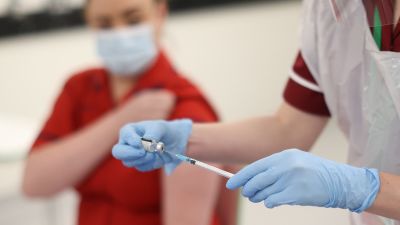Vaccinating entire UK population against Covid-19 could take a year, leading scientists warn

Vaccinating the entire UK population against Covid-19 is likely to take almost a year, even with no interruptions, leading scientists are warning.
While the rapid development of coronavirus vaccines is a "remarkable achievement", there is still a long way to go, Sir Jeremy Farrar, director of the Wellcome Trust and a member of the Scientific Advisory Group for Emergencies (Sage), which advises the government, and Professor Tim Cook, a consultant in anaesthesia and intensive care medicine from the University of Bristol, said.
Writing in the journal Anaesthesia, they said: “The scale of the vaccination programme should not be underestimated: 1,000 vaccination centres each vaccinating 500 people a day for five days a week, without interruptions of supply or delivery, would take almost a year to provide two doses to the UK population.
“No country has mounted a whole population vaccination campaign in living memory and it will need to be undertaken with local leadership and cultural sensitivity.”
Currently only the Pfizer/BioNTech vaccine has been approved for use but the Moderna, and Oxford and AstraZeneca jabs look likely to be approved in the coming weeks.
It is estimated that about 20% of the UK population may decline to receive the vaccine, but the authors say that if 80% of people have the jab “there would finally be the prospect of a degree of population (herd) immunity”.
This would “reduce virus transmission in the community to very low levels and protect both those who are vaccinated and those who are not.
“In contrast to population immunity following natural infection, this would be achieved without the cost of an estimated half a million UK deaths.”
The authors said it may be that early vaccines work on preventing serious illness or coronavirus taking hold in an individual, rather than preventing people passing the virus on.
“Vaccine success may be through stopping an infection becoming established in an individual (disease prevention); stopping progression to severe disease in infected individuals (disease attenuation); or preventing onward transfer of disease (sterilising immunity),” they said.
“Whether all three of these goals will be met by ‘first generation’ vaccines is not known, but is vital to the long-term success of the programme.
“Sterilising immunity is particularly important as it is epidemic modifying.
“However, it may require nasally administered vaccines or adjuncts. From pre-clinical studies, it is possible that the first vaccines, likely to be released in late 2020, may be more effective in preventing disease progression and hospitalisation and less effective in preventing transmission.”
They said gathering ongoing data as vaccines are used will mean that “improved second and third generation vaccines may be available later in 2021 and beyond”.
However, they warned that vaccines will not be “a final solution to Covid-19”.
They said: “This is now a human endemic infection, which will not disappear, and like all infectious diseases, we will need to learn to mitigate its impact through adapting our behaviour and access to diagnostics, treatments and vaccines.“
On Monday, GP surgeries in England began vaccinating their patients, while care homes in Scotland started giving the jab to their residents.